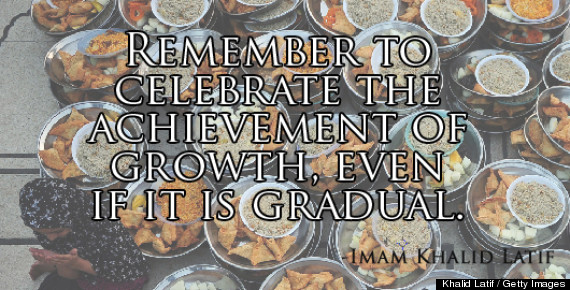
Imam Khalid Latif is blogging his reflections during the month of Ramadan for the fourth year in a row, featured daily on HuffPost Religion. For a complete record of his previous posts, visit his author page, and to follow along with the rest of his reflections, sign up for an author email alert above, visit his Facebook page or follow him on Twitter.
I've been privy to a lot of conversations these first couple of days of Ramadan, many of which have taken a similar tone. A person will speak to me somewhat dejected and when I inquire as to what the problem was, their response is usually something like, "I got upset with someone while I was fasting."
One of the harder things to deal with in these first days of Ramadan is patience, both from people who are testing our patience and people who aren't doing anything necessarily, but we still get bothered by them nonetheless. We might get angry, irritated, annoyed, and frustrated. We might find ourselves in a place where our head is hurting and we want the whole world to just stop talking. All we want is some tranquility and peace, and it seems like everything is rendering just the opposite.
The relationship that our physical, mental, emotional and spiritual spheres have on each other is something that we should understand as we approach these first moments of fasting and more generally in our lives on a whole. As we adjust to a new sleep pattern, get accustomed to a new schedule, and as our bodies gets used to not only not eating and drinking during the day, but also not eating and drinking specific things that helped us get through the day, we will feel a certain tiredness. That tiredness will make it that much easier to give in to our emotions and, if we do give in, cause us to get down on ourselves for doing so.
The Prophet Muhammad, peace and blessings be upon him, once passed by a woman who was crying near a grave. She had not recognized him and as he attempted to offer some comforting words, she responded emotionally, telling him to leave her alone because he did not know what she was going through. He then moved on. Later the woman was told that he was the Prophet and she went to his home to speak with him. She told him that she did not recognize him and he responded simply by saying, "True patience comes at the first stroke of a calamity."
There are a few things that are really beautiful to me from this narration. Primarily, the recognition by the Prophet Muhammad in stepping away from this woman at a time that having a conversation would not have been fruitful. He understood where she was at that moment and did not push a conversation that wasn't meant to be had at the time, regardless of how her response to him might have been. Having been in numerous conversations myself where the reaction I receive from someone is not what I anticipated, I might continue to push the conversation. I would tell myself that I have to keep going because I am trying to help, but in reality my goal has now shifted to dealing with my own emotions, and I pay no attention to the fact that the other person is in no place to actually talk.
Secondly, the woman's willingness to remedy the situation having recognized that she might have been at fault in the way that she talked. You and I are not robots. We are going to get angry, upset, in addition to experiencing a ton of other emotions just as most everyone does. The problem is most of us don't try to fix things once we have acted with those emotions being in control of us, rather than us being in control of them. If you yelled at someone, justifiably or otherwise, or said something that could have been misinterpreted as being harsh or cold, take the time to gather yourself and then try to make things better, both for your sake as well as the sake of the other.
Thirdly, the Prophet Muhammad's response when the woman comes to speak to him about what happened is remarkable. There is no abuse of authority or unwillingness to engage in reconciliation. He responds with gentleness and compassion and leaves no doubt for both that woman and to generations that come after that we can be bigger than our emotions.
Having experienced what causes us tension and trying to remedy what we potentially can after acting upon those triggers, the overall goal should be a recognition of the triggers themselves that caused those emotions to manifest in the first place so that we can begin to better control them. If I get hungry while I am fasting and being around food makes it worse, then I shouldn't sit around people eating or I should gradually let myself get accustomed to it so that it doesn't have the same effect on me. Similarly, I can reflect on what it is that gives me a rise emotionally and grow from the experience by trying to do something about it, even if that something is just avoidance because it is a situation that cannot be changed. We should engage in a deliberate, conscious response that helps us to move forward, rather than staying in a place where the habit remains and we end up losing out the most because of our failure to change.
Remember to celebrate the achievement of growth, even if it is gradual. If up until today you were prone to being a certain way for 10 hours a day and tomorrow you are only that way for 9 hours and 59 minutes, then appreciate that one minute that you conquered and see what you could potentially be. And always be gentle with yourself. To gain patience necessitates patience.
